11. Il Federale aka The Fascist (Luciano Salce, 1961)
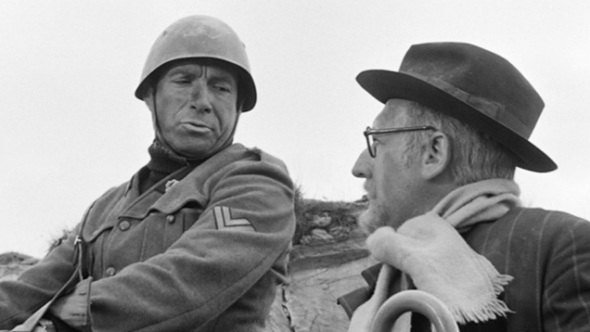
It’s another vision and point of view of the World War II and its Italy. It’s directed by Luciano Salce and is frequently connected to Salce’s in-view of the war. Although released in 1961, the memoirs were still fresh in Salce’s mind, who was a prisoner in Germany during World War II.
The difference between this movie and the others is the privilege given to humoristic moments, with less emphasis to the dramatic background, differing from, for example, “La Grande Guerra”. Salce isn’t usually recognized as one of the greats, by many people, but he is one of the first representatives of the Commedia All’italiana genre that started in 1958.
“Il Federale” is probably his greatest effort combining solid and strong characters with a great plot and funny scenes, focusing his attention and perspective on the fascist obsession for his cause. For that to happen, he partners the fascist with the future leader of what will be a democratic government, Professor Erminio Bonafè, with the mission of taking him to Rome so he could be trialed for his “crimes”.
Although a heavy setting, the movie has great comedic moments and the sadness, usually portrayed in Italian comedy movies, is left behind concentrating its action on the silliness of a man who represents a falling power.
12. I Mostri (Dino Risi, 1963)
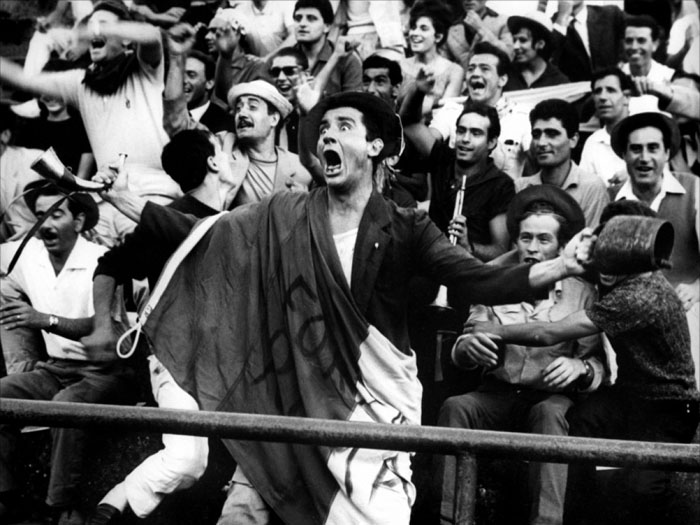
It’s Commedia All’italiana at one of its best moments, giving a clear picture of an Italy in the 60s, which is evolving into an industrialist and consumerist society. It’s comprised of 20 episodes in which its characters are portrayed in a humoristic way. It’s also a great satirical representation of several sectors of Italy such as Marriage, Education, Relationships and Justice, among others.
Vittorio Gassman and Ugo Tognazzi mainly star in this movie, both entering in the 1977 sequel, “Il Nuovi Mostri”, and deliver incredible and versatile performances, showing why they reached such a legendary status in their career. It’s perhaps one of the best plots and best-written movies on this list, thanks to the geniality of its structure and storyline, greatly supported by the extraordinary performances of its main actors.
13. Un americano a Roma aka An American in Rome (Steno, 1954)
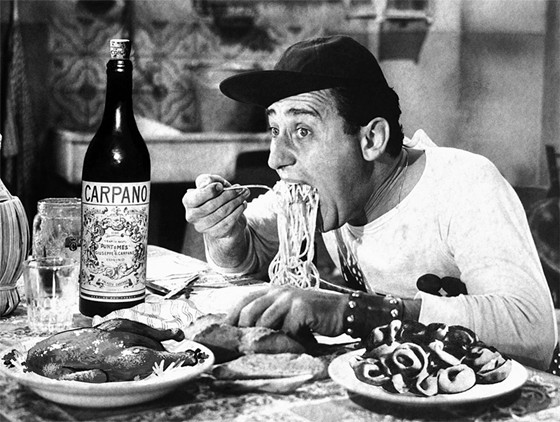
It’s one of Steno’s greatest releases and one of Alberto Sordi’s best comedic efforts. Sordi has one of his most recognized performances in this movie, transforming it into a top-notch comedy. It’s a satire to the US and the Americanization of society in general.
The movie is another “performance-movie”, because Sordi delivers such an incredible performance, making the movie something off the chart. He plays Nando, an Italian who loves the USA and thinks he is an American. He terrorizes his parents and spends time doing frivolous things connected to American culture that truly won’t take him anywhere.
One of the movie’s most famous sequences is the flashback when his father remembers how the son started obsessing with American culture; Nando even talks to a picture of Hitler. By the way, Sordi’s copying of the “American” accent is a hilarious moment in cinema and solidifies the eccentric, bizarre and almost flamboyant, but always funny personality of his character.
14. Johnny Stecchino (Roberto Benigni, 1991)
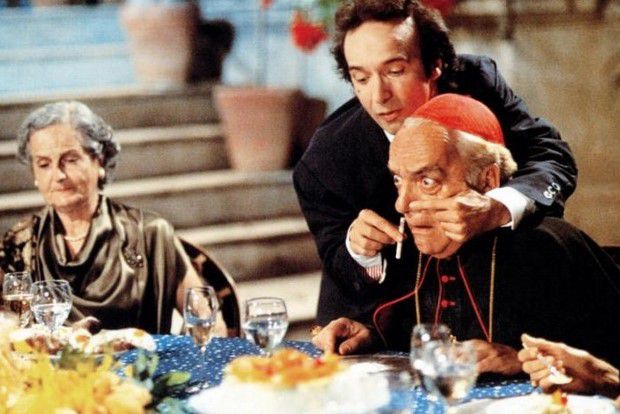
Released in 1991, this movie is still one of the funniest outputs from Roberto Benigni and one of the most important movies of the last 30 years in Europe. It presents a funny character portrayed by Benigni that is recognized in many European countries.
The movie made a mark in European cinema for its charm, intelligence and comedy moments. Characterized by having a great storyline and a great performance by Benigni who plays two different roles, “Johnny Stecchino” is his best output after the masterpiece “La Vita è Bella”.
It tells the story of Dante, a school bus driver for students with Down syndrome, who thanks to his likeness to Johnny Stecchino, a mafia boss, ends up, without knowing it, in a mixed identity scheme to fool Stecchino’s enemies. Dante gets involved in this situation when he meets Maria, played by Benigni’s wife Nicoletta Braschi, who is Stecchino’s wife.
From the first moment Dante falls in love with Maria, who in the beginning uses him to please her husband’s plan, but ends falling in love with Dante’s “charm”. The funny thing is that Dante doesn’t realize what is happening and his most dangerous moment is when he steals… a banana.
15. Fantozzi (Luciano Salce, 1975)
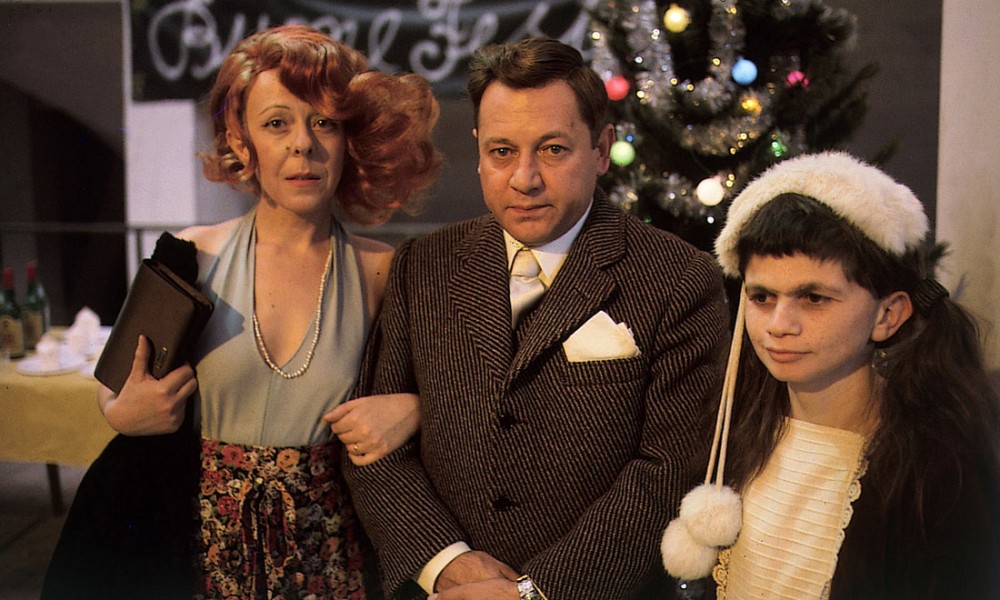
“Fantozzi” is the first movie of a series that became famous throughout Italy and gave national fame to Paolo Villaggio, who played and created Fantozzi. Intelligently directed by one of the most important directors of Italian cinema, Luciano Salce, the movie may be considered as one of the outputs of the new breed of Italian cinema, mainly regarding the genre.
It represents the frustrated middle-class of Italians who want to be successful but can’t catch a break. Fantozzi is a failure and can’t get anything right, failing constantly and having misfortunes in every situation. The Fantozzi Saga is one of Europe’s most successful series of movies. More than a criticism, it shows a satirical in-view regarding the frustrated worker of 1970s Italy.
16. Vedo Nudo aka I See Naked (Dino Risi, 1969)
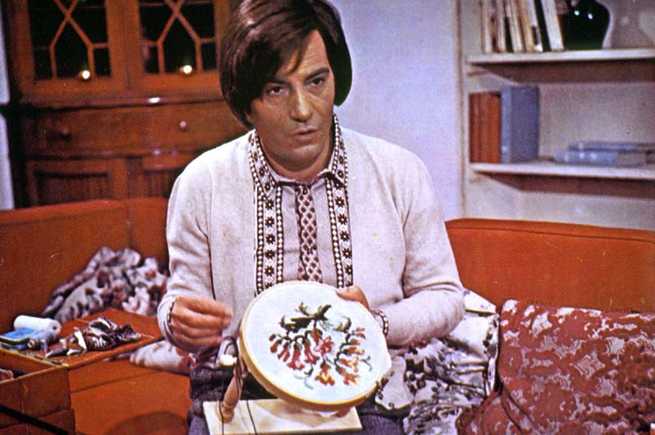
It’s another Risi release and contains the satirical and highly controversial sexual content talked about in the introduction of this list. It was a huge commercial success, and although the movie itself isn’t one of Risi’s greatest releases, its comedic content filled with sexual innuendo and controversial settings makes it one of the mandatory movies for this list.
To headline, Nino Manfredi plays seven different characters in seven different episodes, which represent an Italy with the will to release its “steam”. It’s another Commedia All’italiana, representing the variety with which this genre was composed.
17. La grande Guerra aka The Great War (Mario Monicelli, 1959)
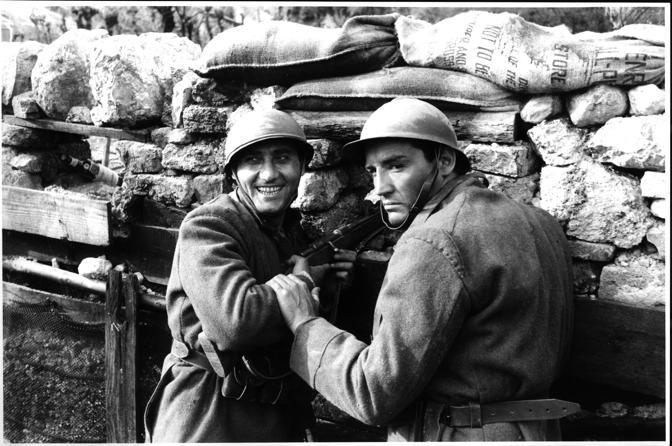
It’s considered one of the most important movies in cinema history, and although it has a comedic perspective, it also shows the tribulations, horror, suffering and dramatic in-views of those who lived through World War I. Another movie directed by Mario Monicelli and released one year after the legendary comedy, “I Soliti Ignoti”, “La Grande Guerra” may be seen as a drama in most of the movie’s moments, while approaching them with comedic perspective, with two very strange characters and the realism of the historic event.
Not only does the movie present a realistic account of the tribulations of World War I and life in the trenches, but it also shows a social point of view of its society, represented by two characters that are caught in the midst of something they don’t want to be in.
It’s a movie marked by two fantastic performances by Vittorio Gassman and Alberto Sordi, playing Giovanni Busacca and Oreste Jacovacci, two very funny characters who end up realizing what is coming to them and the enduring task they must surpass. Always trying to escape, the battle both soldiers fight for survival may be seem as a cowardly act that, for many critics, may have been compensated by their act of courage and altruistic sacrifice toward a stupid and senseless war.
18. Bianco Rosso E Verdone (Carlo Verdone, 1981)
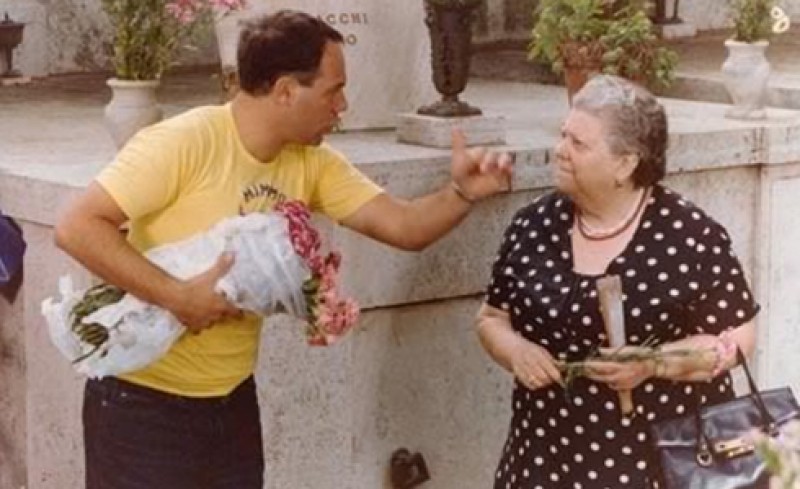
It’s basically a comedy with a powerful sense of performance-comedy. The movie’s story isn’t the reason for its humor and comedic situations, although the story itself incentives the humoristic parts to come out, Carlo Verdone’s performance is the reason for its humor. He stars, writes and directs the movie, which was surprisingly produced by Sergio Leone and its soundtrack created by Ennio Morricone.
Verdone plays three different characters: Furio, Mimmo and Pasquale. All of them are completely different: one doesn’t even talk until the very end and is always screwing up and being robbed; another is obsessive and drives his wife crazy; and the other is a bit of a “man-child” who takes care of his grandma. All of them are traveling to vote in their voting places in some election.
Verdone’s performance of the three characters is indeed superb; it makes the movie completely worthwhile, and although they never interact with each other, there is a common goal. It’s a funny comedy for the entire family with the typical strong language you would expect in an Italian movie, creating a humoristic background as the basis for its comedy.
19. Miseria e nobilità aka Poverty and Nobility (Mario Mattoli, 1954)

It’s a completely straightforward movie with no sentimentality or emotional content. Totò plays the lead role and it’s a joy to watch such a legendary actor being so funny and performing at a top level. Although it’s sometimes referred as a satirical interpretation of poor families, it may also not be as complex as that.
It’s a fine comedy and one of the most influential, where Totò plays the head of a family who, with his colleague, also head of a poor family, pose as aristocrats in request of a Marquis. It’s filled with great comedic moments, not only physical humor but also verbal humor with an amazing performance by Totò giving the movie a completely different edge, making it one of the essentials on this list.
20. Il Vigile aka The Traffic Policeman (Luigi Zampa, 1960)
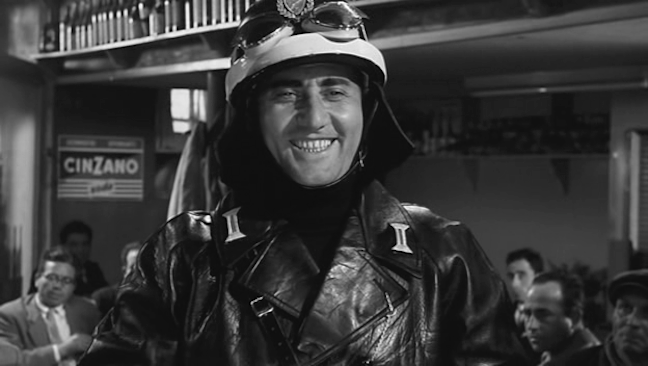
Another movie starring Alberto Sordi with the collaboration of Vittorio De Sica, it’s a light comedies in which Sordi delivers a great performance, making the movie much better than it might have been with another actor. Opposite to other movies on this list, this one isn’t dramatic or even very emotional. It’s an easy-going comedy with satirical in-views of social justice.
Otello Celletti is unemployed, but after insisting with the mayor and with the help of his mechanical genius, Franco, he gets a job as a traffic policeman. Although dedicated, he is disastrous and commits several mistakes that lead to traffic jams and chaos. It’s a great comedy for Sunday afternoons.